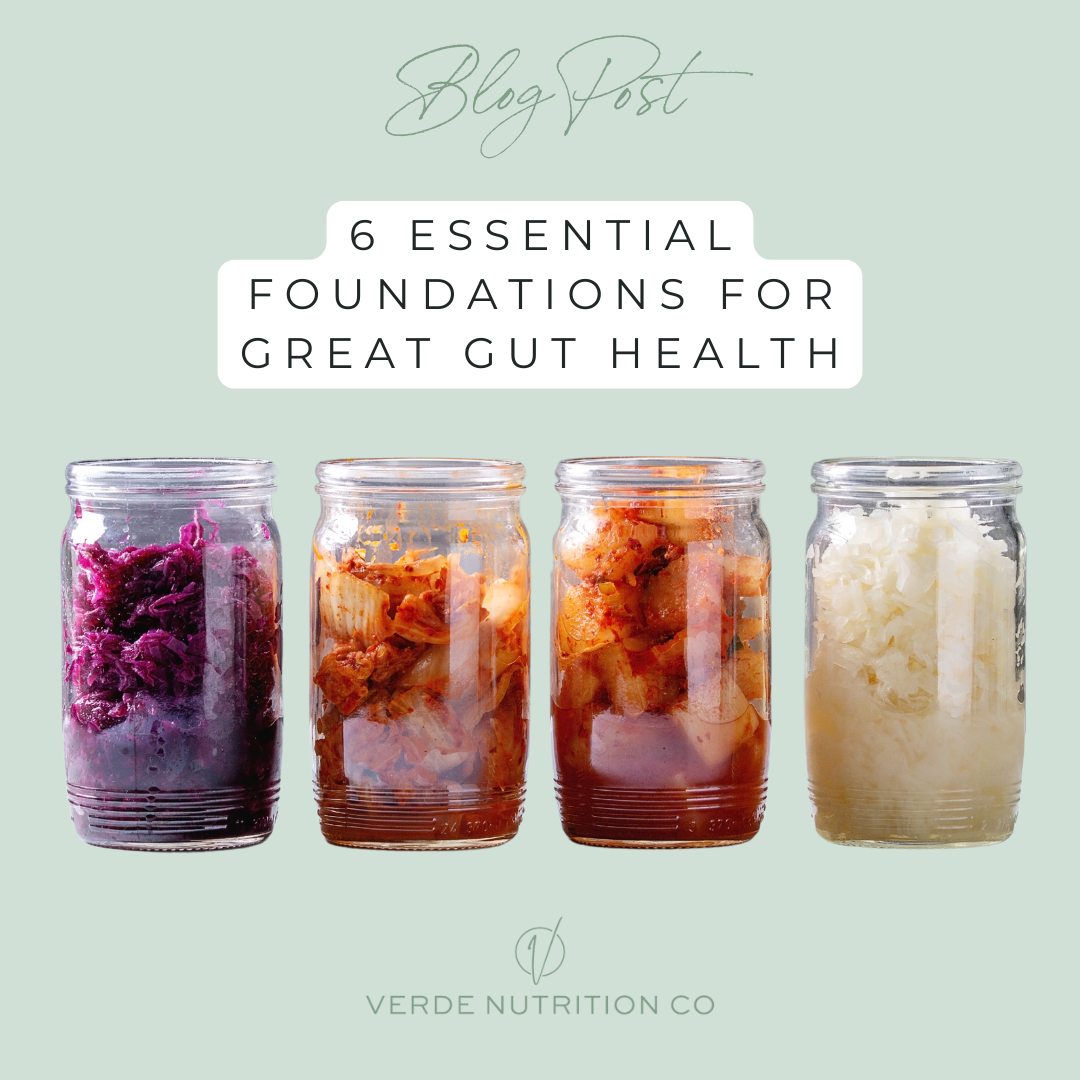The wealth of evidence highlighting the importance of gut health and its influence on a multitude of other systems of the body only continues to grow. Naturally, many of us have become highly motivated to achieve great gut health, which we love to see!
Did you know there’s a lot we can do – relatively inexpensively! – to support gut health foundationally? Before attempting to navigate the overwhelmingly-saturated market of gut-supporting supplements, powders and tonics, ensure you have our six essential foundations for great gut health in place.
If you are struggling with your gut health, or suspect that it may not be functioning optimally, please don’t hesitate to reach out to our wonderful team of Accredited Practising Dietitians for individualised support.
1. Enjoy a diverse array of plant-derived foods. Plant derived foods – encompassing vegetables, fruits, legumes, wholegrains, nuts, seeds, herbs and spices – provide the necessary fuel to ‘feed’ beneficial bacteria within the gut microbiome. Interestingly, the different prebiotic fibres unique to different plants ‘feed’ different species of bacteria, highlighting the importance of plant diversity for a rich and diverse gut microbiome. Research indicates that including at least 30 unique plant-derived foods each and every week promotes optimal gut health.
- Tip: To minimise any potential digestive discomfort, increase your intake of plant foods slowly.
2. Include fermented foods. Fermented foods including natural yoghurt, kefir, kimchi, sauerkraut, miso, tempeh and kombucha naturally contain live cultures and probiotics. As such, consuming them is a great way to augment existing populations of beneficial bacteria within the gut microbiome. Like fibre, fermented foods are also best introduced – and increased – slowly!
- Tip: If you are pregnant or trying to conceive, it’s especially important to be aware of the specific bacterial species included within your diet. In Australia, some species and strains in foods are unknown, and therefore not specified on product packaging. We recommended consulting with either Amanda or Felicity, our wonderful Certified Fertility and Prenatal Dietitians, for individualised advice to optimally support the health of both mum and baby.
3. Stay hydrated. Incredibly important for the body’s natural elimination pathways and bowel regularity, especially when increasing your intake of fibre-rich foods! Aim for 35-45 mL fluid (mostly water) for every kilogram of body weight. If you struggle to consume enough fluid, consider our tips here and here.
4. Move your body. Physical activity promotes blood circulation and muscle tone throughout the body, including the gut! This supports both bowel motility (movement) and regularity. Recent research has also shown that changes in bacterial diversity and abundance within the gut occur in response to exercise – amazing!
5. Manage stress. The demands of modern life promote the consistent activation of the sympathetic nervous system (responsible for the “fight or flight” response) over the parasympathetic nervous system (which promotes the “rest and digest” response). Stress management is essential to support the shift from “fight or flight” to “rest and digest,” enabling the body to focus its energy on digesting and absorbing the nutrients from our food. For this reason, we recommend consuming your meals slowly and mindfully, sitting down and away from your desk and potential stressors. Stress management is different for everyone, but may include movement, mindfulness, breathwork and/or connecting with loved ones – it’s essential to experiment and find what works best for you!
6. Minimise potential irritants. Alcohol, caffeine, spicy foods and foods high in fat may cause digestive discomfort and exacerbate constipation and diarrhoea, particularly when consumed in excess. Sugar alcohols such as sorbitol and erythritol, commonly found in processed foods marketed as being low in sugar, can also be irritating to the gut, causing bloating and discomfort. Everyone is different, so it may take some experimentation to determine your personal tolerance for these foods in your diet.
One last thing. As always, if something doesn’t feel right (for example, you experience severe pain or notice blood after passing a stool) please consult your doctor.
For expert dietary support to meet your unique goals and requirements, book your first appointment with one of our wonderful Accredited Practising Dietitians today.
Written by Caitlin Branch, Student Nutritionist, and Ellie Thompson, Accredited Practising Dietitian.

